



Saint John Henry Newman
In 1991,
John Henry
Newman was
proclaimed venerable by Pope John Paul II, after a thorough examination of his
life and work by the Congregation for the Causes of Saints. After this, Jack
Sullivan, a man studying for the diaconate in Boston, Massachusetts, was on the
verge of complete paralysis in 2000 and 2001 and claimed to have been
miraculously healed after praying to Newman. The miracle was investigated and
confirmed by the Vatican. Newman was beatified on 19 September 2010 by Pope
Benedict XVI on a visit to the United Kingdom.
A second
miracle, necessary for his canonisation, was approved by the Vatican in November
2018. This miracle concerned the healing of a pregnant American woman from a
life-threatening condition. The decree approving this miracle was authorised to
be promulgated on 12 February 2019.
On 1 July
2019 with an affirmative vote the canonization was authorized and the date for
the canonization ceremony was set for 13 October 2019.
It is a well-known fact that at the funeral of Blessed John Henry Newman 20,000
people lined the roads around the Oratory to pay him their respects – this was
quite an achievement and one which even today would provoke media comment. The
question we should ask of course is why 20,000 people turned out to pay their
respects to a nearly ninety year old Cardinal of the Roman Church?
I believe quite simply that the reason was that the people of Birmingham and
beyond recognised that Newman was a saint. Like all saints, the Cardinal’s life
and witness to Christ made him strangely fascinating. Most people are attracted
by great men and women as we have witnessed in our own day in the lives of St
John-Paul II and Blessed Teresa of Calcutta.
Blessed John Henry was recognised even in his own day and certainly in our own
as a great teacher and champion of the faith. Whilst it is wrong to run ahead of
the judgment of the Church as to the sanctity of any man or woman, the judgment
comes normally as a final confirmation, a seal of approval on something that has
been long known by the faithful. The formal canonisation of a saint and in the
case of our Cardinal his proclamation as a Doctor of the Church will be a
recognition of the mind of those 20,000 people and countless others from many
parts of the world since his death in 1890.
So where did Newman’s greatness lie? Why did those 20,000 people believe him to
be a saint? Some say it is because Newman was a great pastor as indeed he was.
Both as an Anglican and a Catholic he was assiduous in his care of souls. At
Littlemore he was remembered for years as the Vicar who visited the sick, cared
for the dying and even bought the children of his parish a pair of shoes each.
As a Catholic too here in Edgbaston he cared for those in the parish and had a
special role in accompanying people on the spiritual journey, through his
prolific letter writing and personal influence – which also marks him as a true
son of St Philip.
Although Newman was a great pastor at the same time and throughout his life he
had a distinctive and profound influence on the lives of many is as a great
teacher of the faith. This he did through his many writings most of which were
written to answer a specific need and his letters which were often written to
those in spiritual need. It is probably above all as a preacher that Newman is
above all a teacher and doctor of the faith. His sermons are not only
masterpieces of English prose but also profound reflections on the Christian
faith. They deal with the perennial problems of people grappling with faith,
striving for holiness and living in charity with others. They are as fresh and
as relevant in our modern age as they were in his own day.
For Blessed John Henry our Christian life is a continual journey of conversion
for him conversion was not an event in his life but a quality of his life. For
him conversion is part of the ongoing search for truth which compels us to
change continually. His life reflects this as we read in the Apologia that from
the age of fifteen there took place in him, he writes, a conversion to Christian
faith which writing as a Catholic priest in his sixties of he was still certain.
Newman’s conversion to the Catholic faith in 1845 was as he said himself a part
of the ongoing conversion or journey of faith in which every Christian engages.
“I was not conscious of firmer faith in the fundamental truths of revelation or
of more self-command; I had not more fervour; but it was like coming into port
after a rough sea.” So he keenly perceived that faith is real not abstract. It
is more than something in the head, a mere notion or a philosophy or on the
other hand a feeling, a sentiment, a taste, or some kind of improving hobby.
Newman himself said that he had spent his life fighting against what he called
“liberalism in religion” which sees religion as having no objective truth. One
religion is seen to be as good as another, one view no better or worse than
another. Newman saw that the effect of such an outlook leads to a complete loss
of any faith and the inability to grow. If there is no truth then we do not
strive to that which is beyond and outside us; we reduce God to our own size and
needs. Unflinching fidelity to the truth as revealed in the conscience and
enlightened by the Gospel caused Newman to enter the Catholic Church which also
involved him in some of the battles and controversies of his life such as the
dispute with Kingsley and his involvement in the Achili trial. Lesser men would
have looked to see which way the wind was blowing.
Newman is truly a teacher of the New Evangelisation. He reminds us that our
faith is at heart a living relationship with Jesus Christ. Like Pope Benedict he
reminds us of the dangers of relativism and the beauty of holiness. I believe
that his life and writings are a powerful instrument of the New Evangelisation
because they spring from a deep personal faith and the all-important encounter
with the living God and His revelation in Jesus Christ. At the heart of our
faith as Newman understood, is a real assent, a certitude about the things of
God, a communion with what he called “the unseen world”, in which Christ, our
Lady, angels and saints, heaven and hell are present as if they were objects of
sight, a religion of persons of the facts of faith and of devotion. Newman
teaches us to love our faith and the Church as the divinely instituted society
through which we are taught in the name of Christ.
In praying for the Canonisation of Blessed John Henry Newman we are praying that
the Universal Church will be given the gift of his wisdom and teaching that many
more may grow in faith and love and that like him we may be drawn from shadows
and images into the truth.
Pope Francis on 13th February 2019 authorised the Congregation for
the Causes of Saints to issue a decree attributing a miracle to the intercession
of the Blessed Cardinal John Henry Newman. The move clears the final hurdle in
the cause for his canonisation.
Following the announcement, Cardinal Vincent Nichols said: "This is wonderful
news which will be greeted with thanks to God by people across the world.
"Newman's exploration of faith, depth of personal courage, intellectual clarity
and cultural sensitivity make him a deeply admired follower of Christ.
"He brings together so many of the best of Catholic traditions shared well
beyond the Catholic Church. His canonisation will be welcomed especially in the
Church of England and the wider Anglican Communion.
"For me the truly remarkable nature of this moment is that this is an English
parish priest being declared a saint. During his life the people of Birmingham
recognised his holiness and lined the streets at the time of his burial. I hope
every parish priest in England will hold his head high today knowing Cardinal
Newman is declared a saint."
Blessed John Henry Newman was a priest, theologian, writer and preacher. His
life spanned most of the 19th century. He was an Anglican for the first half of
his life and became a Catholic in the second half.
Born in London in 1801, Newman studied at Oxford's Trinity College, was a tutor
at Oriel College and for 17 years vicar of the university church, St Mary the
Virgin. He published eight volumes of Parochial and Plain Sermons as well as two
novels. His poem, the Dream of Gerontius, was set to music by Sir Edward Elgar.
After 1833, Newman was a prominent member of the Oxford Movement, which
emphasized the Church's debt to the Church Fathers and challenged any tendency
to consider truth as completely subjective.
Historical research made Newman suspect that the Roman Catholic Church was in
closest continuity with the Church that Jesus established. In 1845, he was
received into full communion as a Catholic. Two years later he was ordained a
Catholic priest in Rome and joined the Congregation of the Oratory, founded
three centuries earlier by St Philip Neri. Returning to England, Newman founded
Oratory houses in Birmingham and London and for seven years served as rector of
the Catholic University of Ireland.
Before Newman, Catholic theology tended to ignore history, preferring instead to
draw deductions from first principles. After Newman, the lived experience of
believers was recognized as a key part of theological reflection.
Newman eventually wrote 40 books and 21,000 letters that survive. Most famous
are his book-length Essay on the Development of Christian Doctrine, On
Consulting the Faithful in Matters of Doctrine, Apologia Pro Vita Sua (his
spiritual autobiography up to 1864) and Essay on the Grammar of Assent. He
accepted Vatican I's teaching on papal infallibility while noting its limits,
which many people who favoured that definition were reluctant to do.
When Newman was named a cardinal in 1879, he took as his motto 'Cor ad cor
loquitur' (Heart speaks to heart). Newman died in 1890 at the age of 89. More
than 15,000 people lined the streets for his funeral.
He was buried in Rednal (near Birmingham) 11 years later. After his grave was
exhumed in 2008, a new tomb was prepared at the Oratory church in Birmingham.
The cause for his sainthood was opened in 1958 and he was declared Venerable by
Pope Saint John Paul II in 1991 after his life of 'heroic virtue' was
recognised.
Pope Benedict XVI beatified Newman on 19 September 19, 2010, at Crofton Park,
near Birmingham. The Pope noted Newman's emphasis on the vital place of revealed
religion in civilized society but also praised his pastoral zeal for the sick,
the poor, the bereaved and those in prison.